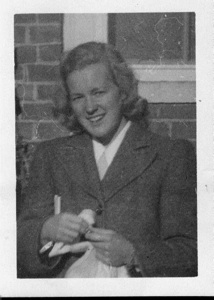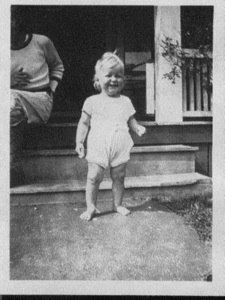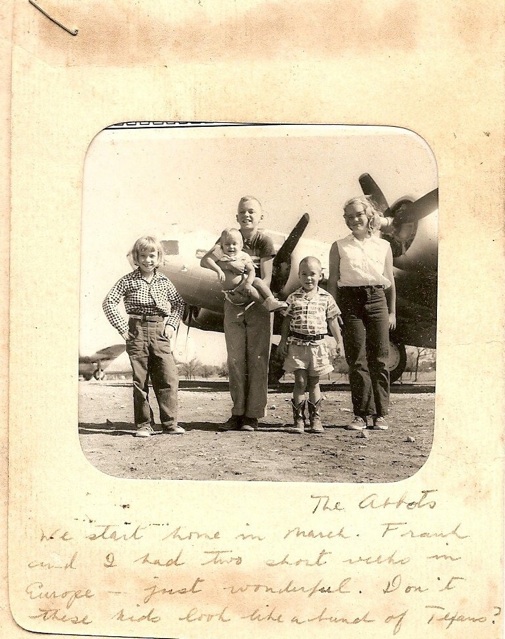
Bideau Abbot family

Bideau was the daughter of Lucy Upham and Bill Hart. Here she is on South Beach with her family - Lucy, Frank, Kim and Bideau herself.


Bideau as a baby - and Bideau at age 16.

“The Abbots on vacation” - notecard to Bill and Mary Stevens - courtesy Sharry Stevens Grunden
_______
Genevieve Abbot
Dads came on weekends. The cocktail parties started in earnest then. But my father didn’t come every weekend like the other dads. He was a resident practicing at Cornell in NYC and when he took the steamer to the Vineyard, it was special. He spent time with us; soaking up every sun-kissed beat in Harthaven.
If I woke up early enough, I caught him on his way across the street to the Young’s beach. He stripped, dove in and, before a serious swim, splashed around like a mad man.
We walked that beach often, talking about important kid things. We collected boat-shells all stuck together, just washed up. We scooped out the sweet treasure underneath the seat and slurped it up.
Our house is the one that still has dark red shutters, next to the Knights (which used to belong to my uncle, Stan Hart). There was a porch on the front of the house – no roof then and no screen. We built a back porch after we were given the house from Mom’s father, William Hart. I associate that porch with Dad because he designed the bright red plywood whale silhouette where we ate supper. It was actually half a whale, cut down the middle with the flat part flush against the screen. We had our own metal stools; each our own color. Mine was either blue or purple. Every night Dad was there, we pulled up our stools and watched the sun set over Farm Pond. It was glorious.
______
Lucy Hart (Bideau) Abbot
Harthaven. Well, our parents were very social and we kids were free to play. It was all unorganized, except for my grandfather Jim's (Howard Hart) boat races. I was always a little afraid of participating in the races and I never really wanted to win. Howdy Eddy was probably the best sailor, and he was always so kind to me. (Phronsie Vibberts and I were about the only girls participating in these races.) I did like to sail by myself, but I didn't like Jim yelling at me during the races. It seems we were barefoot all summer.
I thought everyone lived this heavenly, precious childhood. I seem to remember sitting on a porch one year crying because we were about to return to New Britain. (I was three or so.) I think all of us in my age bracket remember Harthaven being full of wonderful, friendly people. No' doors were ever locked, and all the relatives seemed genuinely happy to see us. My family always walked through the Youngs' yard to go to the beach. We could hear Howard Young's parrot "Perry" saying, "Howard, Howard" or "Mother, Mother" as we went by.
One very friendly part of growing up was the maids we had. We had our Mary, the Youngs their Mary Kerry, and next to us was Emma and August and August's son Augie. Emma seemed to make doughnuts every day; there was one there for you whenever you sat in her kitchen. August, with his deep, gruff voice, was always saying to his son, "Angie, don't do dat." Mary Kerry played pinochle with our Mary, and we used to sit in the kitchen and watch, listening to their stories. We often swam with them at what was known as the "Maids Beach" which was between the sea wall and the jetties to the south.
Barb and Maurice Pease had their Mimi who was always nice to us. There were times we tracked sand into her kitchen or got in her way but she never complained. Aunt Mattie (Martha Hart Moore) had Julie, and I remember her in two ways: pleasant and kind in the house and a magic bowler at our favorite bowling alley. She was often the weekly women's high scorer. It seems disloyal to say it but we had a better time with the maids than we did with our parents. These loyal, kind helpers were an important part of my growing up in Harthaven.
My best friend was my second cousin, Martha Bronson, known as Patty Pease when we were growing up. I was therefore always welcome at the E.A. Moore house. [The home of her grandparents.] Martha had a pony cart (as did Dorsey Coholan), and we used to ride over to Chase's farm behind the golf course. We would play there for hours, helping to harness the horses, watching the pig and just walking in the fields. We also played in the dump until her mother, Barb, found out.
I remember my great grandmother, Martha Peck Hart. She was both kind and stern. She always looked like a very dignified, elderly lady with her long, very dignified dress. We used to play "kick the can" on her lawn and she would let us play with the toys she kept for the kids to play with. But I was always a little afraid of her.
Yes, I was in on those ice cream parties to Edgartown with "Jim". I must have been six or seven, and I was allowed to sit in the rear cockpit of his speedboat, the Wildcat. I'm certain this would never be allowed today! And I remember the clambakes, when they were held in front of the Pease's. Pete Hart and I loved steamers, and we'd gobble up all the leftovers. My father, Bill Hart, was very rigid about the clambakes. He became quite upset when Sandy Low began boiling the food instead of preparing it like a real clambake. After one of those clambakes, Roger Edson, Polly Pease's husband, drove up the lawn of the big White House and tried to even go up the steps .
Grampa Jim was really very generous. Originally he gave a Harthaven cottage to each of his children. Alice (Al) Eddy and her husband Stan received the largest, located across Beach Road from the Youngs' that was later owned by Rosa Stevens and then by Peggy and Eben Clark. My Dad Bill was given the adjacent one to the north, now owned by Mary and Dick Everett. Stan Hart owned the northernmost cottage but sold it to my Dad. Chick and Elaine Knight own this house now. The important thing to remember is that my father was also very generous. He gave a cottage each to my brothers Bill and Stan. For one reason or another, they didn't want to hold on to these and sold them back to Dad. I was then given one of them but Dad later bought this one as well.
Changes? When it was essentially a family enclave, there were no rules or regulations governing Harthaven. For example, boat owners simply took care of the harbor. As more and more "outsiders" moved in, there developed a need for an association with policies and rules. That was kind of sad; the new people didn't realize there was really no need for this. And then I sensed people became more rigid in their ideas. They didn't discuss these policies and rules, they simply accepted. This didn't dim my childhood memories. My grandfather Jim was always great to us kids, though I do agree with those who say he was difficult. For example, he was always interfering with my father (Bill Hart).
After Jim died, my mother and father, Bill and Lucy, moved into the boathouse between the E.A. Moores and Walter Harts. I later inherited this house. The grandchildren of Jim's also selected property on Abel's Hill after he died in 1944. Stan picked the one he now lives on. I picked a three acre lot behind the Abel's Hill graveyard with a beautiful view, but sold it when my son went to college. Judy Hart and Barbara Hart Roberts, Norm and Howdy Eddy and my brother Bill also selected lots there.
I think our family is really interesting, partly because of the many good memories I have, and partly because we ended up in many different ways.
From John Moore’s Book - Harthaven - A History